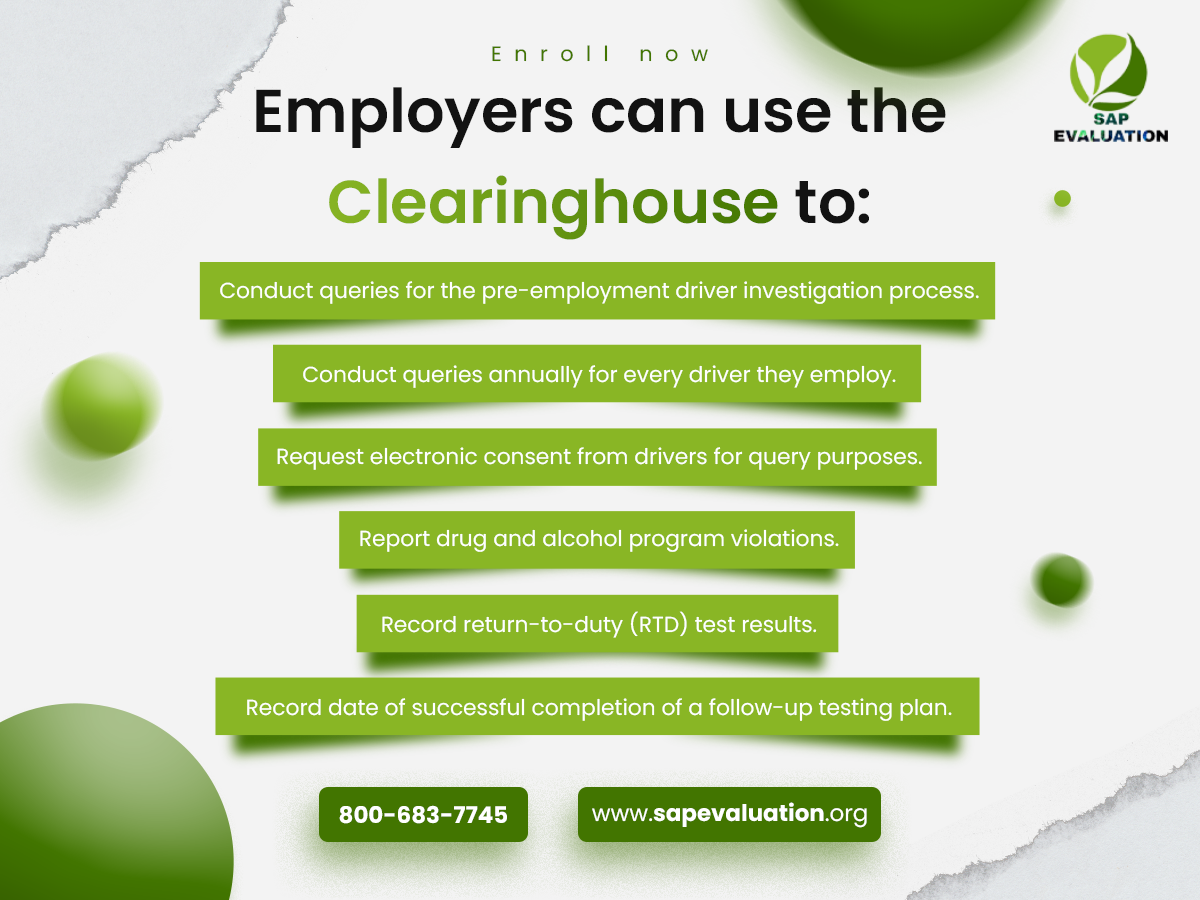
Substance Abuse Professional assessment commonly known as SAP, plays a crucial role in maintaining a safe and drug-free workplace. SAP programs are designed to assess individuals who have violated drug and alcohol regulations in safety-sensitive positions. These programs aim to identify and address substance abuse issues, ensuring the safety and well-being of both employees and the public.
There are different types of SAP programs, each tailored to specific circumstances and requirements. The two primary types of Substance Abuse Professional programs are the Department of Transportation (DOT) program and the non-DOT program. The DOT program is applicable to industries regulated by the DOT, such as transportation, aviation, and pipeline operations. On the other hand, the non-DOT program is implemented by employers outside of the DOT’s jurisdiction. It is important to understand which program applies to your situation, as it can affect the duration of SAP records on your record.
The DOT program has specific guidelines regarding the duration of Substance Abuse Professional records. According to the DOT, SAP records must be retained for a minimum of five years. However, it is important to note that individual states may have additional requirements or regulations that extend the retention period. It is advisable to consult with your state’s regulatory agency or an employment attorney to determine the specific rules that apply to your situation.
The non-DOT program, which includes industries outside the DOT’s jurisdiction, may have varying retention periods for Substance Abuse Professional records. The duration of these records can depend on factors such as state regulations, industry standards, and employer policies. It is crucial for individuals and employers to familiarize themselves with the applicable regulations to ensure compliance and make informed decisions regarding SAP records.
Factors That May Affect the Duration of Substance Abuse Professional on Your Record
While the DOT and non-DOT programs provide general guidelines for the retention of SAP records, several factors can influence the duration of these records on an individual’s record.
These factors include:
- State Regulations: Each state may have its own regulations regarding the retention of SAP records. These regulations can vary in terms of duration and specific requirements. It is important to research and understand the regulations applicable to your state to ensure compliance.
- Employer Policies: Employers may have their own policies regarding Substance Abuse Professional records. These policies can dictate the duration for which SAP records are retained and may differ from state regulations. It is advisable to consult with your employer or human resources department to understand their specific policies.
- Industry Standards: Certain industries may have industry-specific guidelines or standards regarding SAP records. These guidelines can influence the duration of Substance Abuse Professional records and may be more stringent than state or employer policies. It is important to be aware of any industry-specific regulations that apply to your situation.
- Successful Completion of the SAP Program: Success in the Substance Abuse Professional program impacts the duration of SAP records. Completion often means a shorter record duration, while failure or non-compliance can extend it. Failure to complete the program or follow the treatment plan may extend the record’s duration.
The Importance of Completing the Substance Abuse Professional Program Successfully
Completing the SAP program is crucial for those in safety-sensitive roles with drug and alcohol violations. It addresses substance abuse, offering support and resources. Active participation and following the treatment plan show commitment to personal well-being and workplace safety.
Successfully completing the Substance Abuse Professional program can enhance one’s record, demonstrating a commitment to addressing substance abuse. This can boost employment prospects, as many employers favor candidates who’ve finished SAP programs and maintain a clean record.
Furthermore, successful completion of the can also help individuals regain their professional licenses or certifications that may have been temporarily suspended due to substance abuse violations. By demonstrating their commitment to recovery and compliance with regulations, individuals can rebuild their professional reputation and open doors to new opportunities.
How SAP Can Impact Employment and Professional Opportunities
The presence of SAP records on an individual’s record can have various implications for employment and professional opportunities. Employers often conduct background checks and review an individual’s record during the hiring process. SAP records can concern employers in safety-sensitive roles where substance use poses risks to individuals, coworkers, and the public.
The impact of Substance Abuse Professional (SAP) records on job prospects can vary based on factors like the violation, industry, and how one addresses it. Completing an SAP program can be seen positively by some employers, signaling a commitment to recovery and addressing substance abuse. In such cases, SAP records may have a lesser impact on employment prospects.
Steps to Expunge or Mitigate the Presence of Substance Abuse Professional on Your Record
If you have completed a SAP program and are concerned about the presence of Substance Abuse Professional records on your record, there may be steps you can take to expunge or mitigate their impact. It is important to note that the availability and effectiveness of these steps may vary depending on state regulations, employer policies, and industry standards.
Here are some general steps that individuals can consider:
- Understand the Regulations: Start by understanding the regulations applicable to your situation. Research your state’s guidelines regarding the retention and expungement of SAP records. Familiarize yourself with your employer’s policies and any industry-specific guidelines that may apply.
- Consult with an Employment Attorney: If you have concerns about the impact of SAP records on your employment prospects, it may be beneficial to consult with an employment attorney. An attorney can provide guidance on the legal options available to you and help you navigate the process of expungement or mitigation.
- Maintain a Positive Record: Focus on maintaining a clean record and demonstrating your commitment to recovery. Be proactive in your efforts to maintain a drug-free lifestyle, participate in ongoing support programs, and engage in activities that showcase your dedication to personal and professional growth
- Provide Supporting Documentation: If you have successfully completed a Substance Abuse Professional program, gather any supporting documentation that can help reinforce your commitment to recovery. This may include certificates of completion, letters of recommendation, or any other documentation that highlights your efforts toward rehabilitation.
Conclusion: Moving Forward After Completing Substance Abuse Professional Program
In conclusion, SAP record duration varies due to state regulations, employer policies, and industry standards. Understanding the specific guidelines applicable to your situation is crucial for making informed decisions and ensuring compliance. Completing the SAP program positively affects your record, showing recovery commitment and enhancing job prospects. To address SAP record concerns, consider consulting an employment attorney for expungement or mitigation options. With the right steps and a proactive approach, individuals can move forward after completing a SAP Evaluation California and open doors to new opportunities.

